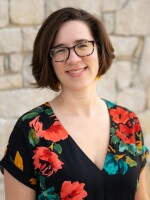Music tells a story. When performing for young listeners, though, it can be difficult to blend storytelling and classical music in an engaging, age-appropriate way.
To fill that need, Leia Barrett, a graduate of the University of Missouri-Kansas City Conservatory, has tapped her experience as the director of education with the Orlando Philharmonic Orchestra to develop a series of musical children’s books — one of which is currently available to view on demand as part of the “Eat, Drink, Play!” series produced at Johnson County Community College.
Part of Barrett's job in Orlando, Florida, was to create programming for concerts designed for the needs and interests of young families. She started the OPO Symphony Storytime Series in 2012, and it found an immediate audience.
“I was struck by how much the kids engaged with having a presentation that was also a physical book that they could take home and relive, because for a lot of these kids this was the first time they’d gone to a concert,” said Barrett, who is now back in Kansas City serving as director of marketing and outreach for Friends of Chamber Music.
There are plenty of children’s stories written and scored for orchestras. Many people became lifelong classical music enthusiasts through introductions of Sergei Prokofiev’s 1936 “Peter and the Wolf” or Camille Saint-Saëns 1886 “Carnival of the Animals,” immortalized by Bugs Bunny and Daffy Duck in 1976. The Kansas City Symphony has produced many family concerts, including Barbara Nichol’s “Beethoven Lives Upstairs” and Lemony Snicket’s “The Composer is Dead.”
But the longer, larger orchestral format doesn’t work well for all ages. And Barrett discovered that family-friendly story options for chamber ensembles — smaller groups of instruments and musicians — are scarce.
“I have found that children, especially young children, do better with chamber music than they do with full orchestra, because they can see the musicians, they can watch them play, and you can create a more intimate environment,” she said.
She also wanted to tell stories that included people underrepresented in classical music. “A lot of the time classical music stories don’t feature girls and they don’t feature people of color and I felt like there was room for that.”
For the Storytime Series, in Orlando, Barrett retold the familiar story of Goldilocks and the Three Bears, adapting the story with a musical theme. She worked with the string musicians to find examples from classical music literature that created an entertaining story while also introducing elements of string playing.
Goldilocks tiptoes into the Bears’ house to an excerpt from Maurice Ravel’s Quartet, which uses pizzicato, or plucked strings. She learns that Papa Bear likes music by Joseph “Papa” Haydn, and she gleefully realizes Baby Bear loves music by Wolfgang Amadeus Mozart as much as she does. The performance includes an excerpt of Claude Debussy’s “Girl with the Flaxen Hair,” arranged by Barrett’s husband, Drew West. West also composed transitional music to tie all the sections together.
To bring the story fully to life on the page and the stage, Barrett collaborated with actor Candace Neal, who not only created the original images, but also narrated the performances.
The result was “The Goldilocks Quartet.”

When the pandemic hit, canceling live performances, Barrett had a little more time on her hands. She dug out her story scripts and started to make the idea into a reality. Though she had tweaked and adjusted the script while in Orlando, there still wasn’t a physical book for kids to enjoy at home, or for teachers to share with their classes.
Barrett was familiar with the work of Kansas City string quartet Opus 76 and approached founder Keith Stanfield about collaborating on presenting the full project. Opus 76 prides itself on being open and accessible to all levels of music lovers, and welcomes children at many of its traditional concerts.
As digital artists-in-residence of the Johnson County Community College’s Midwest Trust Center, Opus 76 hosts an online documentary-style series called “Eat, Drink, Play!” Incorporating a storybook into its “Family Fun” program made perfect sense.
The program is an all-around family-focused presentation. It includes a cooking demonstration; performances from both Opus 76 and its youth ensemble, the Sunrise Quartet; and insights from a clinical social worker. And it features a production of “The Goldilocks Quartet,” with musical excerpts performed by Opus 76.
Barrett plans to self-publish a series of books, called “Musically Ever After,” and she recently launched a crowd-source campaign. Along with publishing the physical book, the project includes an audiobook, narrated by Neal; a soundtrack with the full movements heard in the work, performed by Opus 76; and a full score for all the music involved, including West’s original arrangements and compositions.
“The story needs to hold up by itself without any music or extras,” said Barrett, “but I think having a lot of layers can make it a resource for teachers and families, which is my big goal.”
“Eat, Drink, Play!” featuring “The Goldilocks Quartet,” is available on-demand through March 18. Visit Musically Ever After Publications to learn more about Barrett’s work.
Correction: An earlier version of this story inaccurately stated the composer of The Carnival of the Animals. It was Camille Saint-Saëns.





